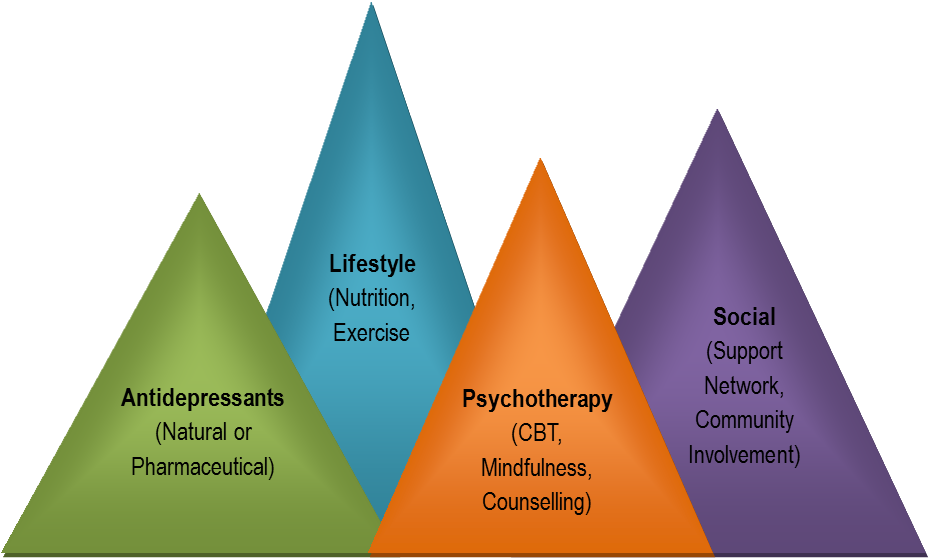Depression
Accessible Online Mental Health Therapy Across Ontario Communities
Feeling down from time to time is a normal part of life, but when sadness and hopelessness persist, it may be a sign of depression. If you’re struggling to find joy in activities you once enjoyed, experiencing changes in sleep, difficulty concentrating, fatigue, or feeling overwhelmed by negative thoughts and self-criticism, you may be experiencing clinical depression.
It’s important to know that depression is not your fault; it’s not brought on by anything a person has or has not done, and it is not something people can simply “snap out” of. You need warm, empathetic and comprehensive treatment to feel better.
During my initial consultation with new patients, I conduct a detailed assessment to accurately understand your mental health. Stress levels, interpersonal relationships, exercise, nutrition, work-life balance, sleep, hormones and heredity all play significant roles in mental and emotional well-being. Addressing these factors leads to more lasting improvements in our mental health.
Understanding the Role of Pharmaceutical Antidepressants
Prescription antidepressants can be highly effective in alleviating the symptoms of depression. For many, they provide the necessary relief to function and find the motivation to engage in other therapeutic activities. However, relying solely on medication often doesn’t bring about lasting change or longer term wellness, and prescription antidepressants aren’t always effective for all people. For these reasons, we need an integrative approach.
Integrating Natural Medicines and Psychotherapy
As a naturopathic doctor and psychotherapist, I use evidence-based natural medicines to support mental and emotional well-being. These natural treatments can be used on their own or in conjunction with prescription medications prescribed by your physician. Some of these natural approaches include:
- Herbal Medicines
- Nutritional Supplements
- Clinical Nutrition: Tailored dietary recommendations
- Lifestyle Changes: Guidance on incorporating healthy habits into daily life
- Stress Management Techniques: Tools and strategies to manage stress effectively
- Psychotherapy: Cognitive behavioural therapy and Mindfulness
The Importance of a Holistic Approach
A holistic approach to mental health considers the whole person—mind, body, and spirit. By addressing the comprehensive factors that impact mental health, we can develop a more personalized and effective treatment plan. Here are some key elements to consider:
- Stress Management
Chronic stress is a significant contributor to depression. Learning effective stress management techniques can greatly improve mental health.
- Interpersonal Relationships
Healthy relationships provide support, understanding, and a sense of belonging. Conversely, toxic relationships can exacerbate depression. It’s important to cultivate positive connections and seek therapy to address interpersonal issues.
- Nutrition
What you eat can have a profound impact on your mood and energy levels. A balanced diet rich in essential nutrients supports brain health and emotional stability. Incorporating foods high in omega-3 fatty acids, vitamins, and minerals provides the foundation of a naturopathic treatment plan.
- Exercise
Regular physical activity is known to improve mood and reduce symptoms of depression. However, I know that when you’re feeling down, exercise can be one of the most difficult things to motivate yourself to do. We can work together to help you strategize your exercise goals one baby step at a time. Ultimately, finding an exercise routine that you enjoy can make a significant difference in your mental health.
- Work-Life Balance
Finding a work-life balance that allows you to rest, pursue hobbies, and spend quality time with loved ones is crucial. I can counsel you on setting boundaries and prioritizing self-care to maintain this balance.
- Sleep
Sleep is essential for mental and physical health. Poor sleep can worsen depression and make it harder to cope with daily challenges. Establishing a regular sleep routine and creating a restful sleep environment can improve sleep quality. Herbal medicines can also be useful in providing additional sleep support.
- Hormone Balance
Hormonal imbalances can affect mood and contribute to depression. For example, thyroid disorders and hormonal changes during the menstrual cycle or perimenopause can impact mental health. During your initial consultation we can assess if hormones might be impacting your mental health.

